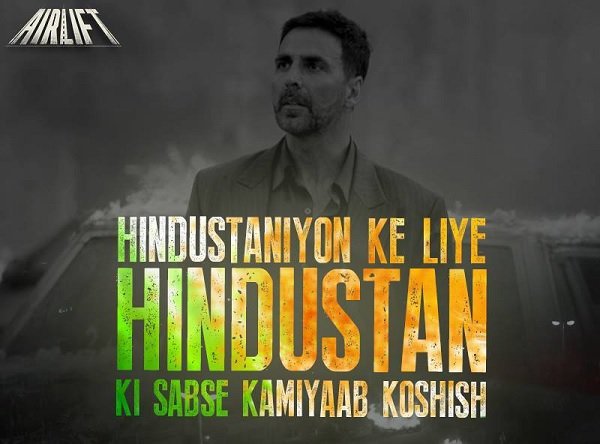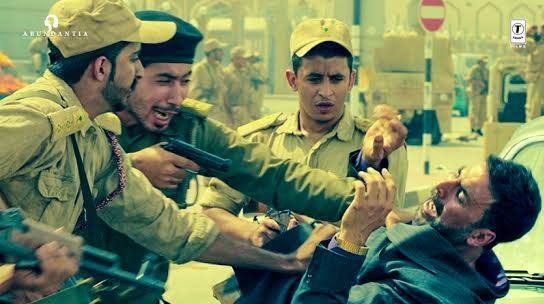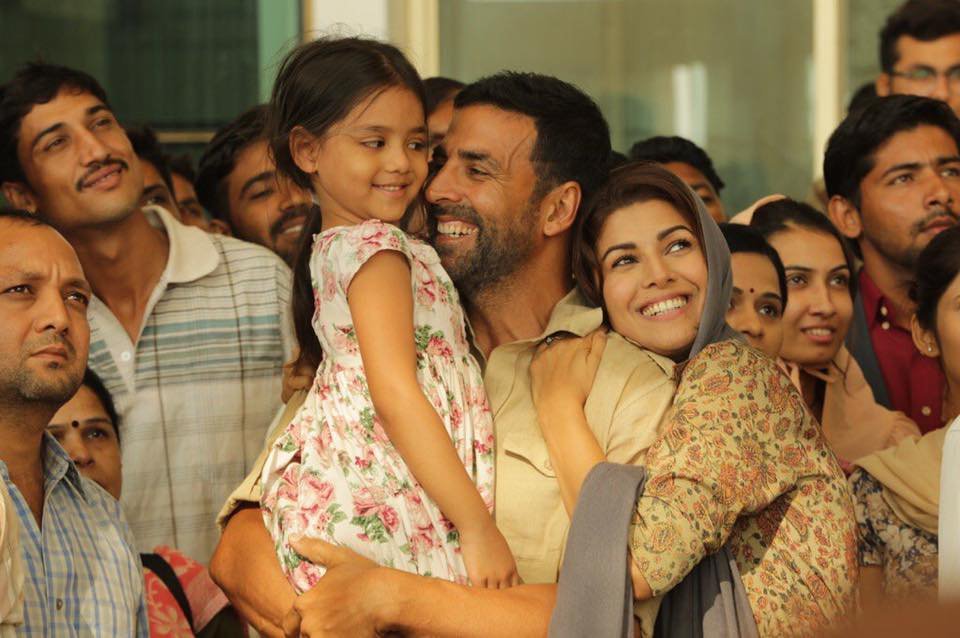Traditionally, it’s been the woman’s job to send the man off to war with a few inspiring words and gestures. Mothers have told sons to kill or be killed. There are stories of wives handing swords to their warrior husbands, their eyes glittering with violent passion. In Airlift, Amrita (Nimrat Kaur) takes her husband Ranjit’s (Akshay Kumar) face in her hands when he’s lost his mojo, looks deep into his eyes and says huskily, “You’re a negotiator, baby.” If being called a negotiator doesn’t fire your loins into action, what kind of a businessman are you?

It’s this sort of awkwardness that shows up all the time in Airlift, an ambitious but uneven attempt at an action thriller based on real events. Set in 1990, the film is about one of India’s most awesome achievements — evacuating more than 1,10,000 citizens after Iraq invaded Kuwait in 1990.
The strength of Airlift lies in the story’s dramatic background. At a visual level, it’s often quite powerful even though most of the visual effects are lamentable. There’s a sense of urgency in the way the camera moves. The sight of Kuwait’s burning skyline may well trigger memories for those whose near and dear were trapped when the city state was invaded by Saddam Hussein’s army. The shelters and roads all feel realistic, which is impressive.
Unfortunately, this sense of credibility is punctured too regularly. It happens in the very first scene, in which we see Ranjit concluding a meeting with a group of sheikhs. The dialogue is in Arabic and it sounds groan-inducingly stilted. It’s a shaky start for Kumar’s Ranjit, but the actor shoulders his responsibility of being the film’s star ably. His character is a combination of two real people, but this hasn’t helped the writers create a realistic personality. If you think about what Airlift tells us of Ranjit, it’s all largely incoherent. One minute, he’s frowning at Hindi film songs and the next, he’s singing a song in Hindi with belly dancers for company. He says he wants to be considered Kuwaiti, but glugs red wine and before you can say “tandoori chicken”, he’s discovered his heart is actually wrapped in a tiranga. Fortunately for everyone, Kumar can somehow make all this seem convincing.

Unfortunately, the rest of the cast in Airlift can’t. For instance, Nimrat Kaur’s Amrita is jarringly fake, with her stiff performance, perfectly styled hair and immaculate make-up (even while a war rages outside). It’s difficult to believe that the actress who was so masterfully subtle in The Lunchbox can be so monotonous and flat in this film. Even the characters who should feel realistic — like Prakash Belawadi as the insufferable George, who is the quintessential complainer; there’s always someone like that in a group — the performances and writing make them feel plastic.
Still, when Ranjit is initially trying to grow into the Moses-like role that he’s been given by the Indians around him, Airlift is enjoyable. The poster with its tagline of “1,70, 000 people, 488 flights, 59 days, 1 man” suggests a tight, adrenaline-packed story. After an action-packed start, there’s barely any sense of a countdown in Airlift. Soon after the Iraqi invasion and particularly after interval, it falls into a lethargic loop of Ranjit making calls to India, chatting with men in Kuwait and then looking helpless.

The only person who helps Kumar in the task of holding on to the audience’s attention is Kumud Mishra as a bureaucrat in Delhi. Ever-dependable, Mishra takes a tiny, thinly written role and turns it into a warm, emotionally rich person. It’s a shame that the script is unable to use the conversations between Mishra and Kumar’s characters to present nuances of their personalities and show their changing relationship.
As it stands, Airlift teeters between trying to provide a gritty account of a real-life adventure and being a masala film. Much of the politics is simplified for the benefit of the ‘masses’, which wouldn’t have been worth pointing out if it didn’t make the characters seem shallow and the narrative feel disjointed. For instance, Inaamulhaq plays Major Khalaf bin Zayd, a stereotypically corrupt army officer. He expects bribes and gets a high from seeing once-powerful people bow down before him. With his ill-fitted uniform, Inaamulhaq looks like a minor actor from a village jatra performance. He also sounds like a cartoon, thanks to his hilarious Arabic accent. Conceptually, it’s a good idea to have a villain who seems ridiculous but is dangerous at the same time. However, in the film, the major quickly becomes a joke and doesn’t add the tension that he should have to Airlift.

The real failure in Airlift’s writing isn’t that it simplifies the politics or that it’s snuck in masala moments like the one in which Ranjit gets into a fistfight with Iraqi soldiers. It is the script’s inability to show that there actually is heroism in mundane activities like making phone calls, getting hold of groceries and keeping calm while someone yells at you for no reason. In the way that it’s structured, Airlift seems to be working up to a grand climax, except that’s not the kind of conclusion this story can have if it is to stay true to fact. Watching Airlift will make you realise just how much skill goes into writing the pulpy action movies Hollywood churns out, seemingly effortlessly.
All images from Airlift’s Official Facebook Page

















